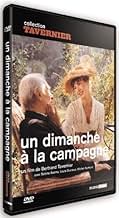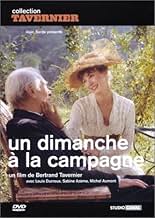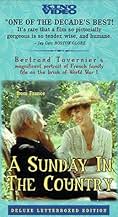IMDb रेटिंग
7.4/10
3.4 हज़ार
आपकी रेटिंग
अपनी भाषा में प्लॉट जोड़ेंAn elderly painter whose son visits with his family on the weekends, is also surprised by a visit from his still-single daughter.An elderly painter whose son visits with his family on the weekends, is also surprised by a visit from his still-single daughter.An elderly painter whose son visits with his family on the weekends, is also surprised by a visit from his still-single daughter.
- निर्देशक
- लेखक
- स्टार
- 1 BAFTA अवार्ड के लिए नामांकित
- 13 जीत और कुल 12 नामांकन
Sabine Azéma
- Irène
- (as Sabine Azema)
Geneviève Mnich
- Marie-Thérèse
- (as Genevieve Mnich)
फ़ीचर्ड समीक्षाएं
I think this film can be appreciated on several levels. For some viewers, this is just a happy family portrait, reflecting a more peaceful time and recalling one's own memories of family outings and quiet Sunday afternoons. I think this point of view is mistaken, but I can see why people feel this way. The film is externally slow- moving and peaceful, like a sunny river. But like a river, there are strong currents lurking, invisible, under the surface -- currents that cannot be seen, but only observed indirectly from their effects.
There's a lot more going on here than just ninety minutes of bucolic peacefulness. Pay attention to the details, the small looks and gestures, the things said and things left unsaid. You can almost see the fine strands that link the characters, like a spiderweb, where each character's movements are felt by all the others. The role of the narrator, often disparaged in film, is used effectively here, giving the film a somewhat novel-like quality and reminding the viewer of their presence as an observer.
There's more to be said about this film, but I don't feel quite up to it. In any case, the real meaning of the film can't easily be described in words -- which is a good thing, or the film would be unnecessary. So watch the film yourself, if you haven't already, and see what you think.
There's a lot more going on here than just ninety minutes of bucolic peacefulness. Pay attention to the details, the small looks and gestures, the things said and things left unsaid. You can almost see the fine strands that link the characters, like a spiderweb, where each character's movements are felt by all the others. The role of the narrator, often disparaged in film, is used effectively here, giving the film a somewhat novel-like quality and reminding the viewer of their presence as an observer.
There's more to be said about this film, but I don't feel quite up to it. In any case, the real meaning of the film can't easily be described in words -- which is a good thing, or the film would be unnecessary. So watch the film yourself, if you haven't already, and see what you think.
In early 20th century France, an impressionist painter is visited at his country estate by his grown children. This is a very low-key film where nothing much happens but where one experiences the satisfaction of having spent a Sunday afternoon in the country engaged in conversation with intelligent people. Ducreux is excellent as the patriarch nearing the end of his life who relishes the visit from his dutiful son and free-spirited daughter, but is overcome with feelings of nostalgia and perhaps regret. The cinematography is gorgeous, with images suggesting impressionist paintings. The soundtrack appropriately consists of chamber music, that of Faure.
A lot of people consider it Tavernier's best .
An old man lives in the country in a desirable property.He waits for his children's visit .Whereas his son ,Gonzague,who lives a bourgeois life with wife and kids frequently turns up,his daughter Irene , a socialite ,a woman ahead of her time is often too busy in Paris to remember his old papa.
On a clear sunny day,they all gather in the father's house .Suddenly the house does not look that much cozy.The novel on which the movie is based is called "Mr Ladmiral Va Bientôt Mourir" (M.Ladmiral is soon going to die)and Death shows beneath the placid surface : a terrifying vision of the old man on his death bed -there is a similar scene in John Huston's last work-;a fleeting souvenir of a picnic in the garden where they used to eat (wild?) strawberries;more prosaically,when the family arrives near the church,they can hear "Nearer to thee ,my God" (the Titanic band's canticle!).
The admirable sequence in the Guinguettes displays not only Tavernier's tribute to Auguste Renoir,but also his love for the true masters of the French cinema:Auguste's son Jean ("Une Partie de Campagne") ,Julien Duvivier ("La Belle Equipe") and Jacques Becker ("Casque d'or").
This is a brilliant movie by the man who is perhaps the greatest living French director.His command of the picture is so fascinating that even the frequent voice -overs are not redundant.
Like this?Try these.......
Make way for tomorrow Leo McCarey 1937
Une Partie de Campagne Jean Renoir 1936
Wild Strawberries Ingmar Bergman 1957
Eglantine Jean Claude Brialy 1971
The dead John Huston 1987
An old man lives in the country in a desirable property.He waits for his children's visit .Whereas his son ,Gonzague,who lives a bourgeois life with wife and kids frequently turns up,his daughter Irene , a socialite ,a woman ahead of her time is often too busy in Paris to remember his old papa.
On a clear sunny day,they all gather in the father's house .Suddenly the house does not look that much cozy.The novel on which the movie is based is called "Mr Ladmiral Va Bientôt Mourir" (M.Ladmiral is soon going to die)and Death shows beneath the placid surface : a terrifying vision of the old man on his death bed -there is a similar scene in John Huston's last work-;a fleeting souvenir of a picnic in the garden where they used to eat (wild?) strawberries;more prosaically,when the family arrives near the church,they can hear "Nearer to thee ,my God" (the Titanic band's canticle!).
The admirable sequence in the Guinguettes displays not only Tavernier's tribute to Auguste Renoir,but also his love for the true masters of the French cinema:Auguste's son Jean ("Une Partie de Campagne") ,Julien Duvivier ("La Belle Equipe") and Jacques Becker ("Casque d'or").
This is a brilliant movie by the man who is perhaps the greatest living French director.His command of the picture is so fascinating that even the frequent voice -overs are not redundant.
Like this?Try these.......
Make way for tomorrow Leo McCarey 1937
Une Partie de Campagne Jean Renoir 1936
Wild Strawberries Ingmar Bergman 1957
Eglantine Jean Claude Brialy 1971
The dead John Huston 1987
I saw this film sixteen years ago, at a time when I did not see many 'filmhouse' movies yet. It made a strong impression on me, I wasn't used to so many 'open spaces' in films, which spectators have to fill according to their own ideas. Later I understood that once you start filling these 'holes' with pieces of yourself, the film becomes much more personal.
From time to time I think back to this film, like I did just now when I looked it up in the IMDB. Its storytelling, or rather story-hinting, is apparently so strong that even after sixteen years I am looking for some answers to the questions that the film raises.
In short: go see it.
From time to time I think back to this film, like I did just now when I looked it up in the IMDB. Its storytelling, or rather story-hinting, is apparently so strong that even after sixteen years I am looking for some answers to the questions that the film raises.
In short: go see it.
I saw this film as a gift. For images, reminding the work of an Auguste Renoir, for portrait of family and the small gestures defining the relations between its members, for lovely acting and for the good state of soul inspired by it.
I discovered it, in same measure, as a beautiful gift offered by Bertrand Tavernier. A precious gift about meaning of life and meanings of visits, about the games of children and problems of adults, about joy and the shadows of sadness, about a venerable manner and the lady helping him in ordinary problems.
Nostalgia ? Off course, but it represents more and , scene by scene, you feel it.
A beautiful film as a precious circle of emotions.
I discovered it, in same measure, as a beautiful gift offered by Bertrand Tavernier. A precious gift about meaning of life and meanings of visits, about the games of children and problems of adults, about joy and the shadows of sadness, about a venerable manner and the lady helping him in ordinary problems.
Nostalgia ? Off course, but it represents more and , scene by scene, you feel it.
A beautiful film as a precious circle of emotions.
क्या आपको पता है
- ट्रिवियाThe film is included on Roger Ebert's "Great Movies" list.
- गूफ़Irene's flower in her bodice disappears and then reappears.
- साउंडट्रैकQuintette pour piano et cordes Op. 115
Written by Gabriel Fauré
Performed by Le quatuor Via Nova, Jean Hubeau piano solo
टॉप पसंद
रेटिंग देने के लिए साइन-इन करें और वैयक्तिकृत सुझावों के लिए वॉचलिस्ट करें
- How long is A Sunday in the Country?Alexa द्वारा संचालित
विवरण
- रिलीज़ की तारीख़
- कंट्री ऑफ़ ओरिजिन
- भाषा
- इस रूप में भी जाना जाता है
- A Sunday in the Country
- फ़िल्माने की जगहें
- Château du Grand Saint-Léger, Villers-en Arthies, Val-d'Oise, फ़्रांस(house and garden)
- उत्पादन कंपनियां
- IMDbPro पर और कंपनी क्रेडिट देखें
बॉक्स ऑफ़िस
- US और कनाडा में सकल
- $24,11,143
- दुनिया भर में सकल
- $24,11,143
- चलने की अवधि1 घंटा 30 मिनट
- ध्वनि मिश्रण
- पक्ष अनुपात
- 1.66 : 1
इस पेज में योगदान दें
किसी बदलाव का सुझाव दें या अनुपलब्ध कॉन्टेंट जोड़ें



























